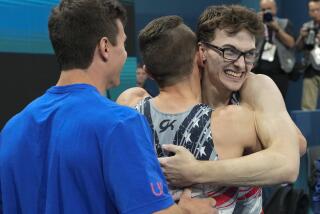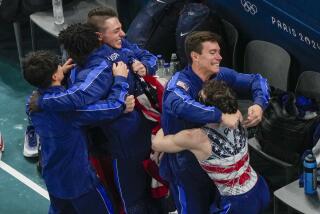World Alpine Ski Championships : Nierlich Strikes Gold Again in Men’s Slalom
- Share via
VAIL, Colo. — As they skied off into the Rocky Mountain sunset Sunday, with a blond Austrian named Rudi leading the way, the world’s best racers were still trying to figure out what happened here the past two weeks.
The final day of the World Alpine Ski Championships was somewhat typical of the preceding 14:
--Rudolf (Rudi) Nierlich, relatively unknown until he won the men’s giant slalom last Thursday, emerged as the star of the show by also winning the gold medal in the slalom.
--”La Bomba” again fizzled out, going pfft! in the first run and leaving the Italian team without a medal.
--Pirmin Zurbriggen couldn’t negotiate even the first three gates of the first run, and the Swiss hero departed without a gold medal--just a silver in the super-G and a bronze in the giant slalom.
--Marc Girardelli of Luxembourg, touted as a possible winner of three, four or even five gold medals after he took the men’s combined, finally picked up his second medal of any color, a bronze, by finishing third behind Nierlich and West Germany’s Armin Bittner.
--The U.S. Ski Team failed to finish the race, losing Felix McGrath and Jack Miller in the first run, and Bob Ormsby and Kyle Wieche in the second.
It was a mixture of the usual and the unusual, but then the tone was set for these championships in the opening ceremonies by former President Gerald R. Ford, who welcomed the athletes of the world “to the great state of California, er. . . . “
As usual, Switzerland topped the final medal count with 11 of the available 30, but Austria was closing fast, winding up with six, and tied the Swiss in gold medals with three apiece. West Germany was next with four medals.
The United States? As has been duly recorded, Tamara McKinney made Americans proud with a gold medal in the women’s combined and a bronze in the slalom, but the rest of the team seems still to be in the rebuilding year that started in 1985.
Maybe the construction job will be complete by the next world championships, at Saalbach-Hinterglemm, Austria, in early 1991, or at the latest, by the 1992 Winter Olympics at Albertville, France.
In the meantime, Alpine skiing means, literally, the Alps.
Nierlich, who will be 23 a week from today, grew up not far from Salzburg, Austria, on the shores of the Wolfgangsee, where his mother still works as a cook. He has two sisters and an older brother, and was sort of an All-Austrian Boy, except for one incident in his youth when he had his driver’s license taken away.
His coach, Hans Pum, dismisses that affair by saying, “It was just a juvenile mistake. One glass of beer too many, that’s all. It’s all forgiven and forgotten now.”
Nierlich’s first racing breakthrough came when he won a World Cup giant slalom at Schladming, Austria, just before the 1988 Winter Olympics. At Calgary, he finished fifth in the giant slalom but was eliminated in the slalom.
He sounded an early warning that he would be a man to contend with here when he won a World Cup slalom last month at Wengen, Switzerland, after an earlier giant slalom victory at Kirchberg, Austria.
On Sunday, Nierlich trailed Bittner by a quarter of a second after the first run, with Girardelli another 0.66 behind in third place.
Alberto Tomba, Italy’s double Olympic gold medalist in ’88 and the pre-race favorite to atone for his mediocre showings in earlier races here, had made it about three-quarters of the way down the first course in good shape before the bottom fell out.
He straddled a gate, lost a ski as he plowed through the snow face-first, then cartwheeled down the hill and onto the next bus to Denver.
The Italian media, who were angry enough with their 22-year-old “La Bomba” before the race--with comments such as La Stampa’s “The hero has fallen; (his) scarce desire to train in the summer after (an) orgy of partying (was) an error we hope Alberto Tomba will not repeat”--doubtless are on a feeding frenzy this morning.
With Tomba out, the second run became a question of whether Nierlich or Girardelli could catch Bittner, who was the bronze medalist in this race at the 1987 world championships behind teammate Frank Woerndl, also a first-run casualty here.
Between runs, a series of snow flurries began, reducing visibility for the racers.
“The view was so bad, and I was so tired from racing at this high altitude,” Girardelli said, “that for the last 20 gates (of a total of 74), I was just trying to get to the finish, not go fast.”
Nierlich, who was next, turned in the second-fastest second run (behind fifth-place finisher Jonas Nilsson of Sweden) for a total time of 2:02.85, with Bittner the only contender still to come down.
“I made several mistakes because the course was very hard and rutty, and it was easy to lose control,” Nierlich said, “but I just let my skis run and fought my way to the bottom.”
Bittner appeared to be in command when he posted the fastest interval time but he said, “I tried to ski the next part too well, and I think I lost the race there, in that stretch just before the final steep face.”
The West German was 0.44 of a second behind the winner, with Girardelli another 0.36 back, followed by Paul Accola of Switzerland and Nilsson.
Only 31 of the 92 starters finished both runs without falling or missing gates.
McGrath was well on his way to the lead in the first run, with an interval time 0.07 faster than Bittner, when he missed a gate near the same spot where Tomba went out and skied off the course.
“I just went too straight,” the U.S. Ski Team’s top male racer said. “Of course, I’m disappointed.”
Ormsby was the top American starting the second run, in 11th place, with Wieche, a last-minute replacement for the injured Tiger Shaw, not far back in 14th. However, both missed gates after the midpoint and failed to finish.
Aside from McKinney’s two medals, the highest U.S. placings here were these:
WOMEN--Chantal Knapp 12th in the combined, Hilary Lindh 15th in the downhill, Eva Twardokens eighth in the slalom, and Diann Roffe 14th in the super-G and 10th in the giant slalom.
MEN--Ormsby 13th in the combined, Tommy Moe 12th in the downhill, Moe 21st in the super-G, Wieche ninth in the giant slalom, and no finishers in the slalom.
John McMurtry, the U.S. Alpine director, said after the closing ceremonies: “We won two medals here, and we placed 13 athletes in the top 15 in medal events. That’s a lot more than many people predicted and a great result for our program.”
McKinney is 26, and McGrath will be 26 next month. Of the others, Knapp is 22, Lindh 19, Twardokens 23, Roffe 21, Ormsby 25, Moe 19 (Friday) and Wieche 21.
The long-range U.S. outlook is far from dismal, but that didn’t help in the medal battle here.
“In a way, maybe these championships in the United States came a year too early for us,” McMurtry said.
Or, as time will tell, maybe two or three years too early.
Whatever they were for the U.S. Ski Team, the championships were called a success by Bob Knous, president of the organizing committee, who said Sunday night: “We’re very happy with the way everything went. It now appears that we will generate a small surplus for the event.
“But the real value of holding the event, both for Vail/Beaver Creek and American skiing in general, will come in the long term, as it did for Aspen after it held the 1950 championships.
“When people in Europe turned on their televisions a week ago Saturday and saw that the men’s downhill had been postponed because 24 inches of snow had fallen in the previous 24 hours, it did more for Colorado skiing than the actual race would have done.
“The phone started ringing right away with European skiers wanting to book vacations at Vail in late February, March and April.”
Many Italians, of course, figure that this is what Tomba has been doing at Vail for the last 2 weeks, taking a winter vacation after an extended post-Olympic leave of absence last summer and fall.
Even Bittner, when asked after Sunday’s race what he thought of Tomba’s situation, said: “He has definitely had some special pressure and expectations laid on him here. He certainly didn’t live a normal life after his successful season, not an athlete’s normal life.
“Maybe he took it easy and thought that the other racers were doing the same. But we were all training and improving during the summer, and he just stayed the same.”
Well, not exactly the same. He gained 22 pounds over his normal weight of 190, due in part to his love of his mother’s homemade pasta and Italian wines.
Among his off-season escapades, faithfully chronicled in the Italian press were:
--Allowing a photographer to shoot him in the nude at a spa in northern Italy and then appearing surprised that the photos appeared in a magazine.
--Making a video for a Monte Carlo-based network in which he said he would “conquer Colorado” and wondered why they don’t change the name of the ’92 Winter Olympic host city to Alberto-ville.
--Pursuing, at least verbally, a series of women, including figure skater Katarina Witt, actress Brooke Shields, Princess Stephanie and American skier Pam Fletcher, the last after he arrived at Vail.
While here, Tomba trained, of course, but he also was seen wearing a 10-gallon hat and swaggering up to a poster of John Wayne in a local saloon and saying, “You’ve beaten the Indians, Duke. I’ve won the slaloms.”
Wrong, Bomba. Rudi Nierlich won the slaloms in a world championships that will probably be remembered more for what Alberto Tomba didn’t win.
More to Read
Go beyond the scoreboard
Get the latest on L.A.'s teams in the daily Sports Report newsletter.
You may occasionally receive promotional content from the Los Angeles Times.






